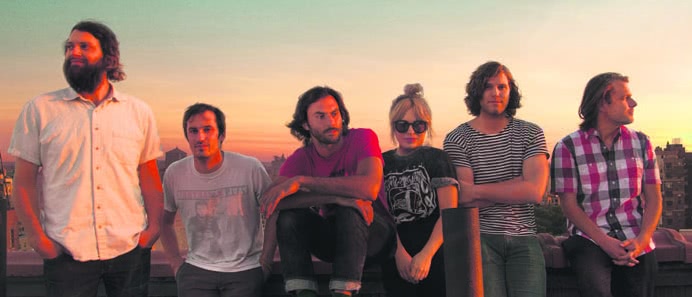It’s easy to romanticise a place’s music scene from afar. The early ’90s grunge movement introduced Seattle in Washington as a mecca of music. While the heyday of grunge has long since passed, the Pacific Northwest hub has been churning out great bands ever since. In recent years, Seattle has given rise to a number of heartwarming indie-pop and folk rock acts, including Fleet Foxes, Band Of Horses and Perfume Genius. The Head And The Heart fit this description, but Josiah Johnson, one of the band’s co-frontpeople, says they’re not part of a unified network of Seattle bands.
“It’s not like in the ’90s when all of the grunge dudes knew each other and were all part of the same scene,” he says. “I’ve never met any of the dudes in Fleet Foxes. It’s not like we’re all friends.”
Perhaps this has something to do with the fact that Johnson and his five bandmates – Jonathan Russell (vocals, guitar), Charity Rose Thielen (violin, vocals), Chris Zasche (bass), Kenny Hensley (piano) and Tyler Williams (drums) – all lived in different parts of the US, working on separate projects, before serendipity united them in Seattle in 2009. The fantasy of a tight-knit community of Seattle artists mightn’t be justified, but cultivating a sound during the city’s indie-folk boom must have influenced the band’s musical direction. Well, no, that’s not true either.
“I don’t think at the time that there was a real sense that that’s what Seattle’s sound was,” Johnson says. “When we got to Seattle the only record that had come out that was in that vein was the first Fleet Foxes record. I can’t think of any other records you’d really call ‘indie-folk’. Maybe the fact that we both have acoustic guitars and have harmonies is similar to Fleet Foxes, but in terms of songwriting they’ve got a much more pastoral, almost Gregorian chant-type melody and harmony structure. We come from a much more pop music-oriented songwriting style.”
It’s an important distinction Johnson makes here. See, The Head And The Heart’s radio-friendly immediacy is precisely what pushed them into the spotlight back in 2010. Without implementing any major marketing strategy – other than writing ear-grabbing pop-rock tunes – after just a handful of hometown gigs, the band’s independently pressed and self-titled debut started selling by the thousands. As a result, hefty offers from several major labels came rushing in. Eventually the band signed with iconic Seattle indie imprint Sub Pop – also home to Fleet Foxes and formerly Band Of Horses.
Of course, The Head And The Heart welcomed their first album’s breakaway success, but it was never the driving intention. So when he’s asked to make an assessment of the success of last year’s sophomore effort, Let’s Be Still, Johnson’s only concern is with the quality of the material.
“It feels like a growth from where we were with the first one. I really like to hear the songwriting [grow],” he says.
Despite Johnson’s relative nonchalance, the impact of The Head And The Heart meant there were stacks of expectant fans waiting on album number two. Upon its release last October, Let’s Be Still debuted at number ten on the Billboard charts, assuaging any fears of the band being a flash-in-the-pan phenomenon. What was more important, though, was Let’s Be Still’s retention of the first record’s breezy, uptempo demeanour. Johnson says the band was able to ensure this by fending off extraneous distractions.
“The six people in the band have a democratic approach to the band,” he says. “[That’s] been good for a lot of reasons – making the second record was one of them. The most important thing for each of us was impressing the other members of the band. Everyone being excited about it was the main goal – and we were. That made making a follow-up record to a record that blew up much easier.”
Bands often suggest that they’re set up as a democracy, but the implementation of democratic policy widely varies. For some, following instructions from a clear leader works best, while other acts function as a platform for multiple songwriting personalities. The Head And The Heart’s version of democracy takes the traditional approach: basically, there needs to be a majority of votes in favour of an idea for it to be accepted into the sextet’s repertoire.
“If people in the band don’t identify with a song, then that song doesn’t end up going out to represent the band,” Johnson says. “Even if you aren’t someone writing the lyrics, there is still some element of accepting a song, being excited about a song.”
The group’s fastidiously democratic ethos means that, while The Head And The Heart are a rather wholesome-sounding unit, pitching songs to the collective isn’t an easy task.
“Showing songs to the band is an art form if you’re one of the songwriters,” Johnson says. “[You have to present it] so that it hits in a way that inspires the people playing their instruments to want to work on it. It pushes everyone to write the best songs possible.”
Obviously, this wouldn’t be achievable if the six individuals didn’t share an aesthetic vision. Johnson underlines the essential target for each song, no matter who the instigating party is. “The first thing to writing songs is to have it say something about your life, but also have it be universal enough that people can identify with it even if they’re not living your life. The band should elevate whatever song a songwriter comes in with. If someone brings in a song and the band doesn’t feel like it can take it to another level in the way that this band does, then we don’t use the song.”
This commitment to making sure all members are satisfied with each and every song is reflected in the collective spirit that characterises the group’s releases. “If another songwriter [in the band] writes a song, you’re just like, ‘Fuck. I have to top this now,’” Johnson says. “There’s certain songs where it’s like, ‘Oh, I wish I had written that,’ and that just makes you want to write a better song. There’s definitely a competition, but in a respect kind of way, not a negative way.
“When Jon and I met, both of us had been in bands for years and had grown tired of it. We were just writing songs on our own but we were fans of each other’s songs. The band formed out of an admiration for each other’s songs and tricks that he knew to songwriting that I found illuminating [and vice versa].”
The Head And The Heart are playing atSplendour In The Grass 2014 withOutkast, Two Door Cinema Club, Lily Allen, Foster The People, London Grammar, Darkside and heaps more atNorth Byron Parklands fromFriday July 25 to Sunday July 27. They’ll also be playing a sideshow atOxford Art Factory on Saturday July 26, tickets online.Let’s Be Still out now through Sub Pop / Inertia.



































